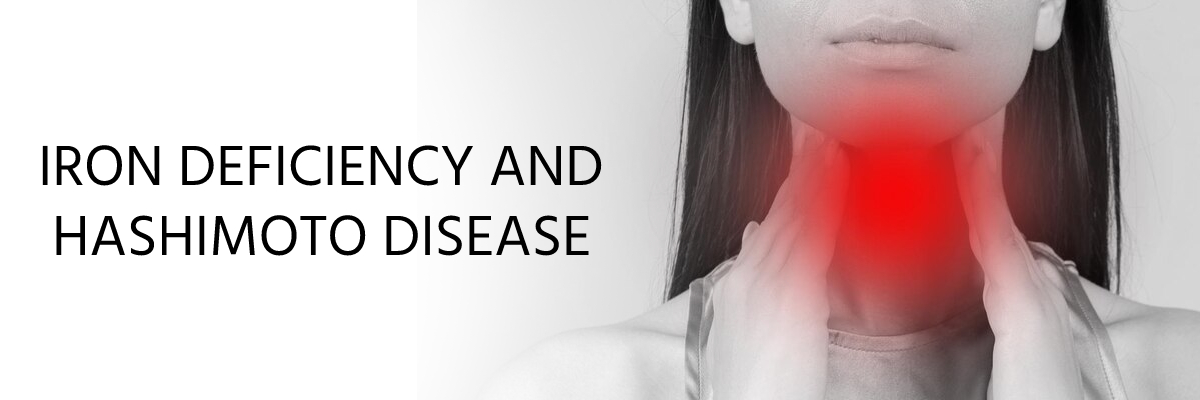
 IJCP Editorial Team
IJCP Editorial Team
IRON DEFICIENCY AND HASHIMOTO DISEASE
Iron deficiency anemia is a common type of anemia in which blood lacks adequate healthy red blood cells to carry oxygen to the tissues. At preliminary stages, it is asymptomatic but as the body becomes more deficient in iron and anemia worsens, the signs and symptoms intensify. The common signs of iron deficient anemia are poor appetite, pale skin, chest pain, fast heartbeat or shortness of breath, headache, dizziness or lightheadedness, brittle hair and nails, weakness and extreme fatigue.
Severe iron deficiency anemia may increase the risk of developing complications that affect the heart or lungs, such as an abnormally fast heartbeat (tachycardia) or heart failure, where the heart is unable to pump enough blood throughout the body at the right pressure. Undiagnosed or untreated iron-deficiency anemia may also lead to serious complications such as thyroid disorders, restless legs syndrome, heart problems, pregnancy complications, and developmental delays in children.
Iron Deficiency and Thyroid Disorders
Iron deficiency or IDA and thyroid disease share a mutual relationship with each other. Hypothyroidism can lead to anemia, and iron deficiency can interfere with thyroid functioning. Hypothyroidism is characterized by low TSH levels which suppress the bone marrow activity to produce red blood cells, triggering anemia. Similarly, anemia can impose severe adversities in hypothyroidism cases as it hinders the oxygen supply to the cells thus aggravating the condition. Research shows as many as 43% of people with symptomatic hypothyroidism have IDA. In addition, clinical studies have proved that an overactive thyroid (hyperthyroidism) is often accompanied by high ferritin leading to inflammatory responses that result in iron deficiency or IDA.
Hashimoto's Thyroiditis
Hashimoto's disease is an autoimmune thyroid disorder resulting in a decline in hormone production (hypothyroidism). Research evidence implicates that genetic susceptibility, environmental factors, and immune disorders contribute to its development. Nutritional factors such as high iodine intake and deficiencies of selenium and iron also show adverse impacts on the condition. Although anyone can develop Hashimoto's disease, it is prevalent among middle-aged women.
Hashimoto's disease progresses slowly over the years with unnoticed signs or symptoms. However, eventually the decline can arise several clinical conditions. The first sign of the disease is often an enlarged thyroid, called a goiter.
Risk factors
The various factors associated with an increased risk of Hashimoto's disease include:
Sex. Women are eight times more likely to get Hashimoto's disease than men.
Age. Hashimoto's disease can occur at any age but is prevalent among middle aged people (30-50 years).
Autoimmune disorders. Autoimmune diseases such as rheumatoid arthritis, type 1 diabetes or lupus make the person more prone for developing Hashimoto's disease.
Genetics. Family history of thyroid disorders or other autoimmune diseases elevates the risk of Hashimoto's disease.
Excessive iodine intake. Excessive iodine in the diet may trigger the risk for Hashimoto's disease.
Radiation exposure. People exposed to environmental radiation are more prone to Hashimoto's disease.
Disease Diagnosis
Signs and symptoms of Hashimoto's disease vary extensively and may be analogous to other clinical conditions; therefore, it is crucial to visit a healthcare provider and seek proper medical assistance for a timely diagnosis and accurate treatment. The diagnostic procedure may include the following:
Medical history review
Physical examination of the throat for signs of enlargement
Blood tests, including thyroid stimulating hormone (TSH) test, free t4 test, and antithyroid antibody test for detecting hypothyroidism
Imaging tests such as an ultrasound for thorough examination of the thyroid gland
Close monitoring of Hashimoto's disease is necessary to scrutinize disease progression and changes in thyroid health.
Treatment for Hashimoto's Thyroiditis
The treatment of Hashimoto's disease involves hormone replacement therapy through medications. This helps in regulating hormonal levels in the body and restores normal metabolism. Usually, a synthetic form of thyroid hormone called levothyroxine is prescribed for hormone replenishment. The dosage of the drug depends on the age, weight, severity of the disease, and other health concerns. Surgery is recommended in extreme cases where the size of the goiter does not reduce with medication.
Complications associated with Hashimoto's Thyroiditis
Thyroid hormones are inevitable for several bodily mechanisms, and untreated thyroid disorders may result in health complications and chronic manifestations. Various clinical conditions associated with hypothyroidism and Hashimoto's disease are:
Goiter. A goiter is an enlargement of the thyroid gland resulting from a declination of thyroid hormone production. It affects the appearance and may interfere with swallowing or breathing.
Heart problems. Hypothyroidism can result in an enlarged heart, irregular heartbeats, and heart dysfunction. It can also increase low-density lipoprotein (LDL) levels, escalating the risks of cardiovascular diseases and heart failure.
Mental health issues. Mental health disorders and depression may occur early in Hashimoto's disease and intensifies with time.
Sexual and reproductive dysfunction. Hypothyroidism can result in reduced libido, lack of ovulation, and irregular and excessive menstrual bleeding in women. Men with hypothyroidism may suffer from reduced libido, erectile dysfunction, and poor sperm count.
Pregnancy Complications. Women suffering from hypothyroidism during pregnancy may have an increased risk of a miscarriage or preterm birth. In addition, infants born to women with untreated hypothyroidism are at risk for decreased intellectual abilities, autism, speech delays, and other developmental disorders.
Myxedema. This rare, life-threatening condition can develop due to long-term, severe, untreated hypothyroidism and requires immediate emergency medical treatment.

IJCP Editorial Team
Comprising seasoned professionals and experts from the medical field, the IJCP editorial team is dedicated to delivering timely and accurate content and thriving to provide attention-grabbing information for the readers. What sets them apart are their diverse expertise, spanning academia, research, and clinical practice, and their dedication to upholding the highest standards of quality and integrity. With a wealth of experience and a commitment to excellence, the IJCP editorial team strives to provide valuable perspectives, the latest trends, and in-depth analyses across various medical domains, all in a way that keeps you interested and engaged.









.png)




Please login to comment on this article